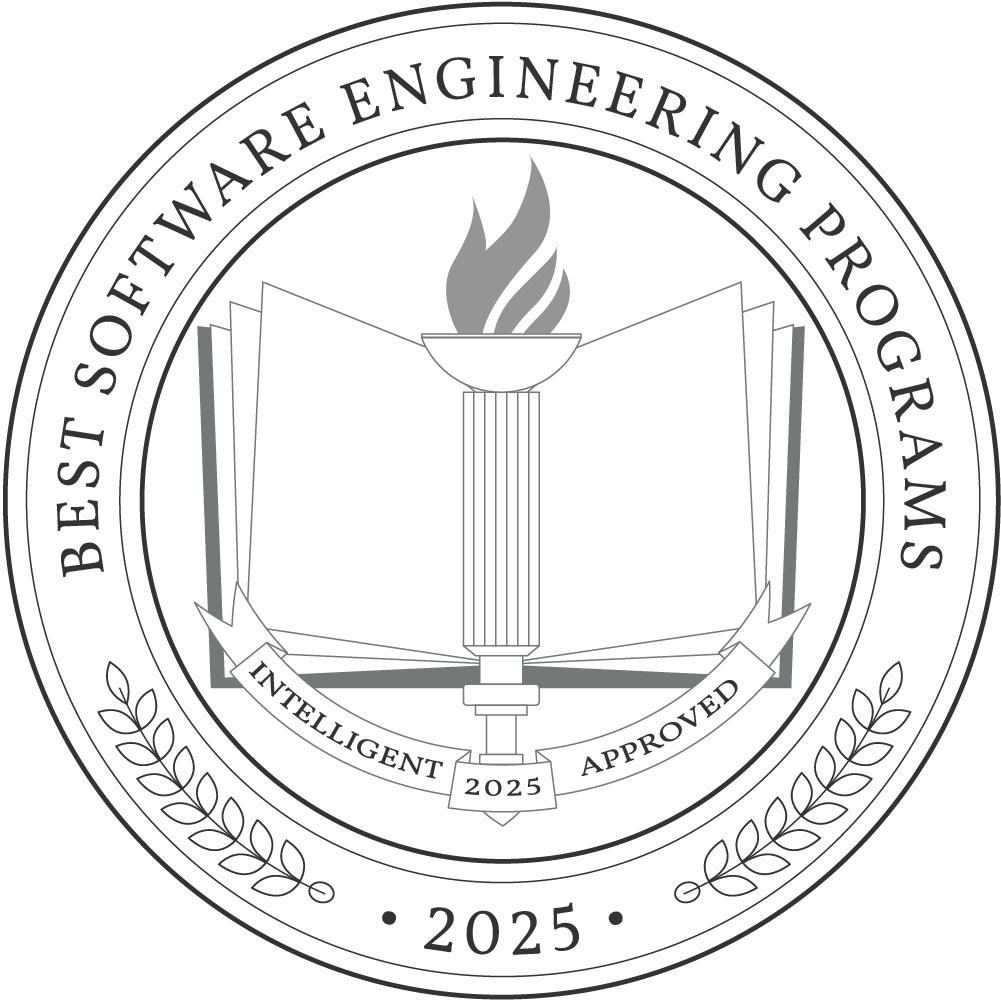A software engineering degree provides students with the skills and knowledge to design, build, and maintain software for various industries. Graduates are hired as software engineers, web developers, cyber security analysts, and programmers. There’s a high demand for software engineering graduates across all sectors, including automotive, aviation, defense, telecommunications, security, and data management.
The median annual salary for software developers is $132,270, nearly triple that of the average United States worker. Wages will vary depending on the position, location, and industry. Those in software publishing have an annual median salary of $143,210, while those who work in computer systems design have a median salary of $127,880.
The average annual cost for a bachelor’s degree in software engineering is $16,618, but it varies depending on the institution, program, and student housing requirements. Most programs require four years of full-time study; however, accelerated and part-time options are available. Students are required to complete between 120 and 180 credits to graduate.
Why Trust Us
The Intelligent.com Higher Education Team is dedicated to providing students with independent, equitable school and program rankings and well-researched resources. Our expert-driven articles cover topics related to online colleges and programs, paying for school, and career outlooks. We use data from the U.S. Department of Education’s College Scorecard, the National Center for Education Statistics, and other reputable educational and professional organizations. Our academic advisory team reviews content and verifies accuracy throughout the year for the most current information. Partnerships do not influence rankings or editorial decisions.
- Analyzed over 2,000 national, accredited, and nonprofit colleges and universities
- 800+ rankings pages are reviewed and updated yearly
- Content is informed by reputable sources, surveys, and interviews with academic advisors and other experts
- Over 100 data points are reviewed for accuracy and quality throughout the year, including sources
How we rank schools
Our list features the best Software Engineering degree programs at top colleges nationwide. Each school featured is a nonprofit, accredited institution — either public or private — with a high standard of academic quality for post-secondary institutions.
We evaluated each school’s program on tuition costs, admission, retention and graduation rates, faculty, reputation, and the student resources provided for online students. We collected data from trusted sources like the National Center for Education Statistics, individual school and program websites, school admissions counselors, and other data sources. Then, we calculated the Intelligent Score on a scale of 0 to 100 based on the following criterion:
Academic Quality:
- Admission rate versus enrollment rate
- Retention rate of students who return after year one
- Accreditation status (regional and programmatic)
- Nonprofit status, both private and public institutions
Graduation Rate
- Overall graduation rate
- Total number of currently enrolled students, including diversity metrics
- Student-to-faculty ratio
Cost and ROI
- In-state and out-of-state per-credit tuition rates and fees
- Required credits to graduate
- Earning potential after graduation
- Availability of federal student loans, scholarships, and other financial aid options
Student Resources
- Available student services for online-only and hybrid programs
- On-campus amenities like tutoring centers and the number of libraries
Read more about our ranking methodology.
Best 44 Accredited Software Engineering Degree Programs
FiltersInstitution Type
Status
- Intelligent Score
- Alphabetically By University Name
- Acceptance Rate
- Enrollment
- In-state Graduate Tuition
- Out-of-state Graduate Tuition
- In-state Undergraduate Tuition
- Out-of-state Undergraduate Tuition

University of California, Irvine
Intelligent Score: 99.48In-state: $11,442
Out-of-state: $41,196
In-state: $11,442
Out-of-state: $11,442
SAT: 1310-1530
ACT: 30-35
$278
On-Campus
Western Association of Schools and Colleges Senior College and University Commission
180

San Jose State University
Intelligent Score: 98.89In-state: $5,742
Out-of-state: $17,622
In-state: $7,176
Out-of-state: $7,176
SAT: 1010-1240
ACT: 19-26
Resident: $294 - $434
Non-Resident: $714 - $854
On-Campus
Accreditation Board for Engineering and Technology
120

Iowa State University
Intelligent Score: 98.16In-state: $8,042
Out-of-state: $23,230
In-state: $9,758
Out-of-state: $9,758
SAT: 1010-1310
ACT: 21-28
In-State: $376
Out-of-State: $1,091
On-Campus
Accreditation Board for Engineering and Technology
125

Michigan Technological University
Intelligent Score: 97.61In-state: $17,339
Out-of-state: $38,082
In-state: $21,744
Out-of-state: $21,744
SAT: 1160-1350
ACT: 25-30
In-State: $682
Out-of-State: $1,519
On-Campus
Accreditation Board for Engineering and Technology
125

California Polytechnic State University
Intelligent Score: 97.15In-state: $33,522
Out-of-state: $53,706
In-state: $40,608
Out-of-state: $40,608
SAT: 1240-1470
ACT: 22-33
Resident: $196 - $289
Non-Resident: $476 - $569
On-Campus
Accreditation Board for Engineering and Technology
183-184

Penn State Behrend
Intelligent Score: 97.02In-state: $29,114
Out-of-state: $39,838
In-state: $49,838
Out-of-state: $49,838
SAT: 1100-1330
ACT: 22-30
Resident: $512
Non-Resident: $870
On-Campus
Accreditation Board for Engineering and Technology
123-124

Arizona State University
Intelligent Score: 96.31In-state: $10,710
Out-of-state: $28,800
In-state: $11,720
Out-of-state: $11,720
SAT: 1100-1320
ACT: 21-28
Resident: $807
Non-Resident: $1,310
On-Campus, Online
Accreditation Board for Engineering and Technology
120

University of Texas at Dallas
Intelligent Score: 96.03In-state: $11,448
Out-of-state: $40,032
In-state: $12,028
Out-of-state: $12,028
SAT: 1210-1470
ACT: 26-33
Resident: $485
Non-Resident: $1,335
On-Campus
Accreditation Board for Engineering and Technology
123

University of Washington
Intelligent Score: 95.59In-state: $10,629
Out-of-state: $37,998
In-state: $16,278
Out-of-state: $16,278
SAT: 1200-1453
ACT: 27-33
In-State: $241
Out-of-State: $867
On-Campus
Northwest Commission on Colleges and Universities
180

Miami University
Intelligent Score: 94.63In-state: $12,637
Out-of-state: $32,464
In-state: $12,554
Out-of-state: $12,554
SAT: 1160-1370
ACT: 24-30
$609
On-Campus
Higher Learning Commission
120

Montana Technological University
Intelligent Score: 94.49In-state: $5,707
Out-of-state: $20,791
In-state: $4,706
Out-of-state: $4,706
SAT: 1110-1295
ACT: 21-27
Resident: $254
Non-Resident: $691
On-Campus
Accreditation Board for Engineering and Technology
120

Kennesaw State University
Intelligent Score: 93.11In-state: $4,450
Out-of-state: $15,704
In-state: $5,328
Out-of-state: $5,328
SAT: 1030-1200
ACT: 19-25
In-State: $185
Out-of-State: $654
On-Campus, Online, Hybrid
Accreditation Board for Engineering and Technology
120

University of Nebraska - Lincoln
Intelligent Score: 92.93In-state: $7,770
Out-of-state: $24,900
In-state: $6,138
Out-of-state: $6,138
SAT: 1110-1320
ACT: 22-28
In-State: $384
Out-of-State: $1,120
On-Campus
Accreditation Board for Engineering and Technology
124

Auburn University
Intelligent Score: 92.54In-state: $10,080
Out-of-state: $30,240
In-state: $10,080
Out-of-state: $10,080
SAT: 1160-1320
ACT: 25-31
Resident: $409
Non-Resident: $1,227
On-Campus
Southern Association of Colleges and Schools Commission on Colleges
122

Washington State University
Intelligent Score: 92.53In-state: $10,202
Out-of-state: $25,145
In-state: $11,781
Out-of-state: $11,781
SAT: 1020-1210
ACT: 20-26
In-State: $548
Out-of-State: $1,352
On-Campus
Accreditation Board for Engineering and Technology
121

Florida Gulf Coast University
Intelligent Score: 92.05In-state: $4,191
Out-of-state: $22,328
In-state: $6,974
Out-of-state: $6,974
SAT: 1060-1210
ACT: 21-25
In-State: $203
Out-of-State: $838
On-Campus
Accreditation Board for Engineering and Technology
120

University of Minnesota Crookston
Intelligent Score: 89.46In-state: $13,318
Out-of-state: $31,616
In-state: $17,580
Out-of-state: $17,580
SAT: 1240-1460
ACT: 25-31
$441
On-Campus, Online
Higher Learning Commission
120

University of Central Oklahoma
Intelligent Score: 86.65In-state: $6,686
Out-of-state: $17,573
In-state: $7,000
Out-of-state: $7,000
SAT: N/A
ACT: 18-24
In-State: $242
Out-of-State: $362
On-Campus
Accreditation Board for Engineering and Technology
124
How to Choose a Software Engineering Program
Choose your area of study
Students can pursue three degree levels in software engineering: associate, bachelor’s, and master’s.
Associate degrees are two-year programs that provide foundational knowledge of software engineering. Graduates can pursue entry-level positions in the field or continue their studies with a bachelor’s degree.
Bachelor’s degrees in software engineering are available as a Bachelor of Science or Bachelor of Engineering. These programs often require four years of full-time study and are prerequisites for most entry-level positions. Graduates work as software developers, software engineers, and systems analysts.
A master’s degree in software engineering is a graduate-level program typically requiring two years of full-time study. It provides students with an advanced understanding of software engineering and prepares them for leadership roles in development teams, research positions, and teaching careers.
Students in software engineering programs can select from various specialties on which to focus their coursework. Common concentration areas include cyber security, big data, game development, artificial intelligence, and cloud computing.
Research schools and programs
When researching schools, look for those accredited by recognized institutions, such as the Higher Learning Commission (HLC) and the New England Commission of Higher Education (NECHE). Students who attend a school with regional accreditation will have an easier time transferring credits, receiving government loans, and getting hired after graduation.
Look for software engineering programs accredited by the Accreditation Board for Engineering and Technology (ABET). Programmatic accreditation ensures the curriculum meets universal quality standards and adequately prepares students for future careers.
You can learn more about prospective schools by gathering information in person and online. Consider visiting the school in person, browsing their website, attending an open house, and following them on social media. You can also speak with an admissions counselor to learn more about the school culture and gain insights into the program.
Prepare for tests and applications
Application requirements for software engineering programs vary by school, but most require you to submit the following:
If English is not your first language, you must also take an English language proficiency test. Speak with an admissions advisor before submitting your application to review the required materials, deadlines, and fees.
Select your program
Review your logistical needs and career goals when selecting your program. If you receive acceptance letters from multiple schools, narrow them down by asking yourself the following questions:
- Is the program full-time or part-time?
- Do they offer synchronous or asynchronous learning options?
- Is the program online or in-person?
- What is the cost of the program?
- Do they have housing options?
Choose the program that will set you up for success and prepare you for your future career. For additional guidance, speak with an academic advisor. They’ll review your options and help you decide on the best option for your needs.
Determine how you’ll pay for your degree
Calculate the annual cost of your program to determine whether you can pay for the degree yourself or require financial aid. Include academic costs, including tuition, fees, supplies, and living expenses like housing, transportation, and food.
Visit the Free Application for Federal Student Aid (FAFSA) website and apply to learn the amount of financial assistance you’re eligible for, including scholarships, grants, work-study funds, and loans. You can also ask your employer if they offer employee tuition assistance benefits.
What Can You Expect From a Software Engineering Program?
A software engineering degree gives students an in-depth understanding of software, programming, and computer science concepts. Programs often consist of core courses, in which students will learn the fundamentals of software engineering, and elective courses, which allow students to tailor coursework to their specializations. Typical course topics include the design, usability, testing, modeling, and implementation of software systems.
Students use various learning methods, including labs, lectures, exams, and projects. Programs often emphasize group work, as teamwork is crucial to software engineering and development. The degree usually concludes with an internship or capstone project that allows students to demonstrate the knowledge and skills they learned throughout the program.
Potential courses you’ll take in a software engineering program
- Data Structures. Students learn the fundamental concepts of data structures, including data types, algorithms, sorting, text processing, and analysis.
- Systems Programming. This course covers the development of programs that provide services to software developers. Topics include process creation, linking and libraries, performance measurement, and socket programming.
- Software Processes and Management. Students will learn about the software development process and related management issues. Course topics include process models, tools, software maintenance, configuration management, and team management.
- Concurrent Computing. Students explore the concepts and techniques of concurrent computing, including processes and threads, semaphores, monitors, deadlock, message passing, and mutual exclusion.
- Introduction to Combinatorics. This course provides a fundamental understanding of combinatorics. Topics include set theory, integers, functions and relations, permutations, combinations, and graphs.
Software Engineering Degree Program Frequently Asked Questions
How do I apply to a software engineering degree program?
Visit the program page of your prospective school to determine the admission requirements and deadline. Most software engineering programs require you to submit your high school transcripts, SAT or ACT scores, a letter of recommendation, and a personal statement. As requirements vary by school, speaking with an admissions advisor to review the application process and ensure you have the required materials is essential.
How much does a software engineering degree cost?
The average annual price for an undergraduate software engineering degree is $16,618, but it varies by school and program. Students should consider additional costs that may increase this, such as housing, transportation, supplies, and living expenses. Part-time students may incur lower annual fees due to the reduced credits taken per year.
How long does it take to earn a software engineering degree?
Most software engineering degrees require four years of full-time study and 120 to 180 credits for graduation. Part-time and asynchronous programs are available, which allow students to complete the program at their own pace. Some institutions also offer accelerated programs that take two to three years to complete.

